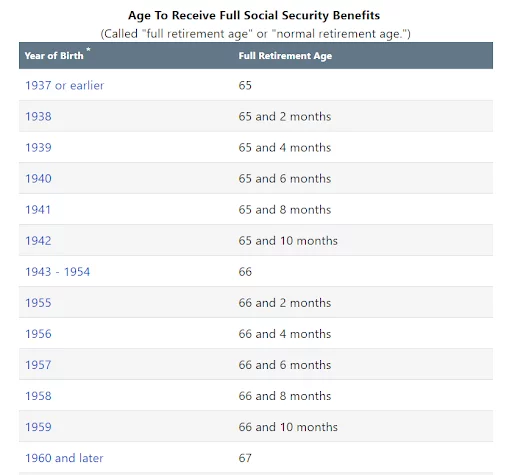What’s the Full Retirement Age? Get the Facts. Know the Rules.

For decades, full retirement age was 65 years old. But receiving social security benefits has changed, including a higher retirement age and early-retirement options.
Last month, we looked at working after retirement—what it means to collect benefits early, as well as the advantage of waiting a little longer. This month we jump into the nuts and bolts of full retirement age: What it is and how it works.
Early vs full retirement
The earliest you can receive social security benefits is age 62. It’s important to understand that by drawing on your social security early, your benefits are reduced. For example, if you claim social security at 62, you will receive 70% of your benefits…
- At 63, you’ll get 75%.
- At 64, you’ll get 80%.
- At 65, you’ll get 86.7%.
- At 66, you’ll get 93.9%.
- At 67, you’ll get 100%.
Additionally, should you apply for early retirement between birthdays, the amount you receive will be calculated according to the additional month. That means, at 62 and one month, your benefit will be 70.4%. At 62 and 2 months, you’ll receive 70.8%, and so on.
Ultimately, if you can delay claiming Social Security until full retirement age, you’ll receive 100% of your benefits.
Watch those earnings (during early retirement)
Also keep in mind that if you work while receiving early retirement benefits, the Social Security Administration (SSA) has an extra-earnings limit. Currently, that amount is $17,640. If you exceed that amount, you will receive less money in your retirement check.
However, once you reach full retirement age, you can earn any amount of money and still receive 100% of your social security benefits.
What will your full retirement age be?
In 1983 the Federal Government changed the legal full retirement age to 67 for those born in 1960 and later. For everyone born after 1937 and before 1960, the legal retirement age increases as follows:
Source: https://www.ssa.gov/planners/retire/retirechart.html
Don’t forget your Medicare age
Whether you draw benefits early or wait until you’re 70, you will still need to sign up for Medicare benefits at age 65. If you are approaching 65, this is a good time to talk to your Medicare specialist.
Mark your calendar
Maybe you intend to draw social security early at age 62 or maybe you’ll wait until you reach full retirement age. Regardless, planning is key to a smooth and happy retirement. That includes knowing the retirement benefits dates and rules and how they apply to you.
The Social Security Administration (SSA) website is a great source of information. It offers many resources for understanding your retirement benefits, including this full retirement article
and age calculator.
At MSHP, we’re here to help you sort out all your retirement and benefits questions.
Need a clear answer regarding your retirement age or Medicare benefits? Give us a call: (877) 255-6273


